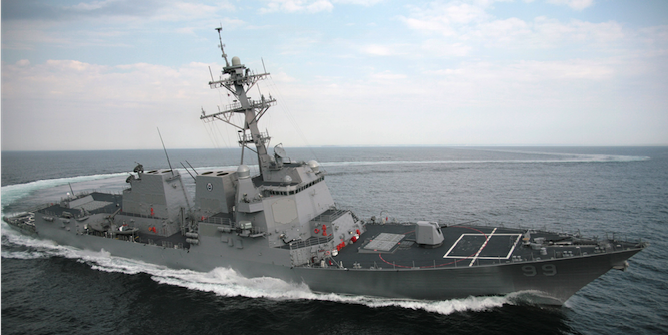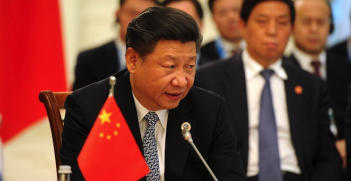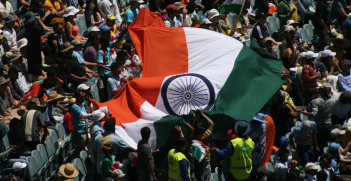Steering off the Collision Course: How to Promote Stability in the Indo-Pacific

Despite recent increasingly assertive actions in the Indo-Pacific, there remain peaceful paths to explore.
Many commentators have argued that the Indo-Pacific nations, especially China and the US, are on a collision course due to escalating strategic rivalries in the region. Rising nationalism, great power dynamics, historical grievances and political manoeuvring are all contributing to rising tensions, especially in the South China Sea. Contemporary strategists broadly fall into two schools of thought on this topic: Hugh White’s view that one side will eventually concede strategic space or John Mearsheimer’s assertion that conflict is inevitable. Despite these concerns, there are actions that can be taken to alleviate regional tensions and achieve a more balanced, calmer region.
This is perhaps the most crucial point of Indo-Pacific rivalries, and is worryingly overlooked. The actions that countries are already undertaking today greatly influence the likelihood of future conflicts. Wars are not preordained. Events leading up to conflict are developed over a period of time by conscious human decision-making and the decisions on a conflict in the Indo-Pacific are being made now. For those who seek relative peace, the question then becomes, what actions can be taken now to mitigate threats and increase regional stability?
One possible answer is for states to cooperate proactively on common issues in the region such as piracy, disaster management and illegal trafficking.
This approach of productively addressing shared issues, despite other differences, has a proven track record of strengthening state relations. The post-World War II era showed the power of some states to overcome grievances and develop lasting partnerships. The US and Japan are a key example of this. Despite significant military confrontations, a focus on economics and rebuilding laid the groundwork for one of the strongest regional alliances today. Even highly politicised differences in policies such as the death penalty, gay marriage, drug legislation and migration have not stopped states effectively working together on broader issues and maintaining strong relations. The European Union for example has an unwavering stance against capital punishment, yet it continues to preserve close and prosperous relationships with the US and Saudi Arabia, prolific executioners.
Anti-piracy measures
Anti-piracy operations characterise some of the most successful collaborative interstate efforts in the Indo-Pacific. The truly international response to piracy in the Horn of Africa sometimes overshadows the joint operations against piracy in Asia. Twenty countries have signed on to the Regional Cooperation Agreement on Combating Piracy and Armed Robbery against Ships in Asia (ReCAAP). This agreement is widely regarded as one of the most successful joint initiatives in the region and is representative of the possibilities of further combined efforts. The Singapore-based ReCAAP Information Sharing Centre collates information from all partner nations relating to acts of piracy and sea-based armed robbery. This information is then collaboratively used by members to more effectively address regional piracy issues through joint exercises, capacity building initiatives and cooperative incident responses. The end result of these efforts has been a marked reduction in the incidence and severity of piracy in the region. Joint anti-piracy initiatives also increase the people-to-people and organisational-level ties within the maritime security domain. Considering this regional maritime domain is a highly contested one, any effort which builds goodwill and stability is extremely beneficial. Expanding this already successful agreement to include Malaysia and Indonesia will increase the effectiveness of anti-piracy operations and regional stability.
Humanitarian and Disaster Relief Operations
Humanitarian and disaster relief (HADR) operations are also hugely important in the geologically unstable Indo-Pacific region. The significant costs and capabilities involved mean that few states are amply prepared to respond unilaterally to a serious incident. This is especially true of some of the smaller more susceptible states in the region. Joint HADR operations are notoriously difficult to organise and manage, so cooperation and planning beforehand is an integral element in ensuring an effective response. The Association of South East Asian Nations (ASEAN) and the South Asian Association for Regional Cooperation (SAARC) both have formal disaster response agreements but the Indo-Pacific lacks a joint mechanism between all actors with HADR capabilities. It is crucial to recognise that people’s lives depend on the success of these operations. Subsequently, if politics and cultural differences can be overcome, then there are significant humanitarian objectives that can be achieved as well as broader increase in strategic interstate cooperation.
Illegal Trafficking
Illegal trafficking of people, weapons and drugs is a threat to all states in the region. A 2014 report by the Global Slavery Index noted that almost two-thirds of the victims of human trafficking (23 million people) are from Asia. The porous borders of South-East Asian states are particularly difficult to monitor and thus exceptionally susceptible to illegal trafficking operations. In 2015 ASEAN states acknowledged the risks that trafficking poses and jointly signed the ‘ASEAN Convention against Trafficking in Persons, Especially Women and Children’. This convention acknowledges that there have been similar UN agreements such as the ‘Convention against Transnational Organised Crime’, but that a joint regional response will be more effective than an overly broad global action plan. Although this Convention is still new it provides a sound framework for a wider Indo-Pacific anti-trafficking plan. This framework is sorely needed in the under-institutionalised Indo-Pacific. Crucially, the Convention specifically mentions one of its key objectives is to promote cooperation in the region. As mentioned earlier, regional cooperation not only helps in specific operations, but will build broader regional engagement and strengthen multilateral ties.
Joint responses to these issues will not only increase the effectiveness of responses but will increase regional stability through cooperative relationships. The relationships that grow from such responses extend from the grassroots cooperation to implement joint policies to those at the top levels of government who will progressively notice the benefits of collaborative efforts. These actions will not guarantee long term peace and stability in the region, but they are a step in the right direction – away from escalating rivalries and conflict.
Jaidan Stevens is a Master of Strategic Studies student and current intern at the AIIA National Office. This article is published under a Creative Commons Licence. It may be republished with permission.





